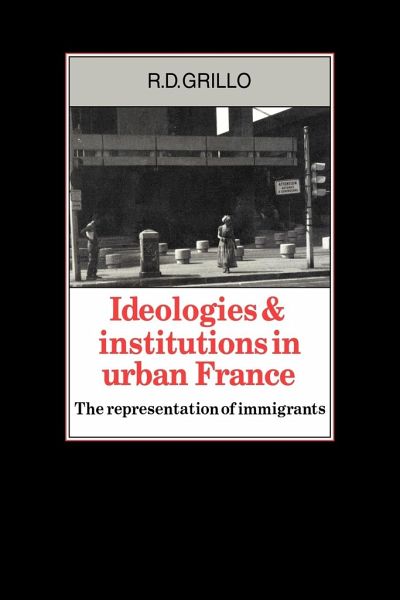
Ideologies and Institutions in Urban France
The Representation of Immigrants

PAYBACK Punkte
22 °P sammeln!
Presents a detailed account of relations between the indigenous French population and immigrant workers and their families of non-French origin.Increasingly, anthropological techniques have been applied to the study of urban life in Western Europe. In this book, based on intensive fieldwork in a major French provincial city (Lyon), Grillo shows how an anthropological perspective enhances our understanding of institutional processes and ideological forces in industrial society, presenting a detailed account of relations between the indigenous French population and immigrant workers and their fa...
Presents a detailed account of relations between the indigenous French population and immigrant workers and their families of non-French origin.
Increasingly, anthropological techniques have been applied to the study of urban life in Western Europe. In this book, based on intensive fieldwork in a major French provincial city (Lyon), Grillo shows how an anthropological perspective enhances our understanding of institutional processes and ideological forces in industrial society, presenting a detailed account of relations between the indigenous French population and immigrant workers and their families of non-French origin. The framework of the book is provided by two linked themes. First, the study shows how the situation of immigrants is represented ideologically by various elements of French society, as well as by the immigrants themselves, in different ways as 'problematic'. Dr Grillo examines this ideological dimension initially by contrasting the discourses of the political Right and Left concerning a range of immigrant 'problems', for example in the fields of housing, family life, school, language use and work. He then shows that not only are there significant ideological differences within both Right and Left, but also similarities between them which stem from certain basic cultural preoccupations of French thought.
Table of contents:
List of tables, figures, and maps; Acknowledgments; Glossary of abbreviations and acronyms; 1. Introduction; 2. Immigrants in France and in Lyon; 3. Two modes of discourse: immigrés and étrangers; 4. Urban development and the problems of housing: the 'bachelors'; 5. Housing and the 'problems' of immigrant families; 6. North African women and the French social services; 7. In the schools and on the streets; 8. Language; 9. Work; 10. 'The strike is like a school'; 11. The representation of problems and the problem of representation; 12. Conclusion: institutional and ideological structures; Appendix: The French school system; Bibliography; Maps; Index.
Increasingly, anthropological techniques have been applied to the study of urban life in Western Europe. In this book, based on intensive fieldwork in a major French provincial city (Lyon), Grillo shows how an anthropological perspective enhances our understanding of institutional processes and ideological forces in industrial society, presenting a detailed account of relations between the indigenous French population and immigrant workers and their families of non-French origin. The framework of the book is provided by two linked themes. First, the study shows how the situation of immigrants is represented ideologically by various elements of French society, as well as by the immigrants themselves, in different ways as 'problematic'. Dr Grillo examines this ideological dimension initially by contrasting the discourses of the political Right and Left concerning a range of immigrant 'problems', for example in the fields of housing, family life, school, language use and work. He then shows that not only are there significant ideological differences within both Right and Left, but also similarities between them which stem from certain basic cultural preoccupations of French thought.
Table of contents:
List of tables, figures, and maps; Acknowledgments; Glossary of abbreviations and acronyms; 1. Introduction; 2. Immigrants in France and in Lyon; 3. Two modes of discourse: immigrés and étrangers; 4. Urban development and the problems of housing: the 'bachelors'; 5. Housing and the 'problems' of immigrant families; 6. North African women and the French social services; 7. In the schools and on the streets; 8. Language; 9. Work; 10. 'The strike is like a school'; 11. The representation of problems and the problem of representation; 12. Conclusion: institutional and ideological structures; Appendix: The French school system; Bibliography; Maps; Index.




